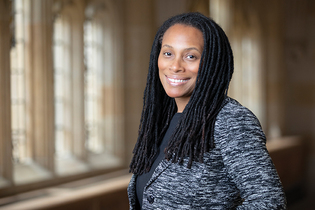
Dan Renzetti
An internist and public health researcher, medical school professor Marcella Nunez-Smith studies health inequities among people of color and the poor.
View full image
For years, Marcella Nunez-Smith, an associate professor of internal medicine, public health, and management at Yale, has worried about the impact of disease outbreaks in communities of color and the poor.
As a clinician, researcher, and professor, she has worked to overcome all the things that can get in the way of providing high-quality care to those in need. If patients do not trust their doctors, if they are confused by a barrage of conflicting health messages, or if they do not know where to turn for diagnosis or treatment, diseases lurk and infections run rampant.
The COVID-19 pandemic has brought Nunez-Smith’s worst fears into tragic focus. It has also spotlighted her as one of the nation’s leading voices about health inequities. So it was no surprise to her colleagues that Nunez-Smith was selected to cochair President-elect Joe Biden’s Transition COVID-19 Advisory Board. She leads the committee, along with former surgeon general Vivek Murthy ’03MD, ’03MBA, and former Food and Drug Administration commissioner David Kessler, previously a dean of the Yale School of Medicine.
Ever since she was a young girl in the Virgin Islands, Nunez-Smith knew she wanted to be a doctor. After graduating from Swarthmore College in 1996 (where she studied biological anthropology and psychology), she attended Jefferson Medical College in Philadelphia and completed a residency in internal medicine at Brigham and Women’s Hospital in Boston. She came to Yale in 2004 as a Robert Wood Johnson Foundation Clinical Scholar and never left.
Nunez-Smith founded and directs the Equity Research and Innovation Center at Yale. An associate dean for health equity research, she wears a number of other hats at the university and in the wider community. She has been an adviser to medical students, who have her cell phone number—and use it into the evenings and weekends. She also launched the Eastern Caribbean Health Outcomes Research Network and chaired the community subcommittee of Governor Ned Lamont’s Reopen Connecticut Advisory Group.
“She has never failed to inspire me and those around her to do more for our communities and society at large,” says Howard Forman, a Yale professor of radiology, public health, economics, and management. “She brings energy to every meeting; leadership to every group; and empathetic concern to every individual conversation.”
She’ll need all of it for her newest appointment. “We have a lot of work to do,” she wrote me. “Unfortunately, the virus has been highly politicized and we need to unify to contain it. We must also intervene to disrupt the disproportionate impact on communities of color in particular.”
 loading
loading